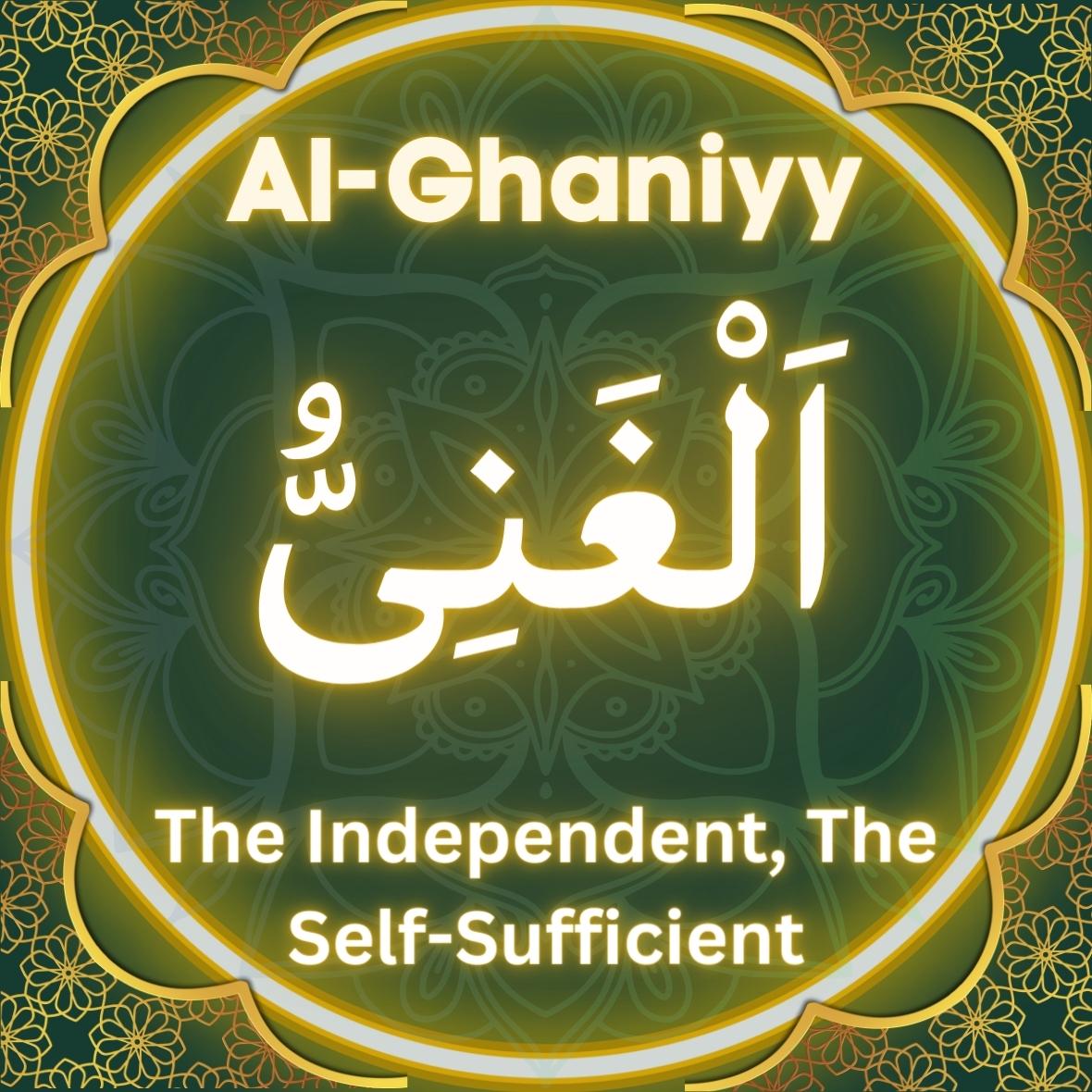Explanation
Meaning of Al-Ghaniyy (ٱلْغَنِيُّ)
The name Al-Ghaniyy (ٱلْغَنِيُّ) is one of the beautiful names (Asma’ul Husna) of ALLAH and carries a deep and comprehensive meaning in Islamic theology. Below is a detailed explanation of this name, along with its Quranic references and significance.
Linguistic and Theological Meaning
-
Etymology:
The name Al-Ghaniyy comes from the Arabic root غ-ن-ي (gh-n-y), which means wealth, sufficiency, self-sufficiency, and being free of need.
It signifies that ALLAH is completely independent of all creation, while all creation is entirely dependent on Him. -
The Absolute Self-Sufficiency of ALLAH
ALLAH does not require anything—neither sustenance, worship, companionship, nor any form of assistance.
Everything in existence needs ALLAH, but He remains eternally self-sufficient, unaffected by the needs of His creation. -
Contrasting Divine Richness with Human Need:
Humans may possess wealth, but they remain dependent on external factors (such as health, time, and circumstances). ALLAH, however, possesses ultimate richness, and His sovereignty is not dependent on anything.
Significance in Islamic Thought
-
ALLAH’s Independence and Absolute Authority:
ALLAH possesses all wealth, power, and dominion, meaning that no act of worship benefits Him, and no disobedience harms Him. This contrasts with human rulers who need followers to maintain their power. -
Human Dependence on ALLAH:
In contrast, every living being is in constant need of ALLAH for sustenance, guidance, and protection. The Qur’an repeatedly emphasizes human dependence:يَـٰٓأَيُّهَا ٱلنَّاسُ أَنتُمُ ٱلْفُقَرَآءُ إِلَى ٱللَّهِۖ وَٱللَّهُ هُوَ ٱلْغَنِىُّ ٱلْحَمِيدُ
“O mankind, you are those in need of ALLAH, while ALLAH is the Free of need (Al-Ghaniyy), the Praiseworthy.”
(Surah Fatir 35:15) -
True Wealth Comes from ALLAH:
- Many people chase material wealth, but ALLAH reminds us that true richness comes from Him.
- The Prophet ﷺ said:
“Richness is not having many possessions, but true richness is the richness of the soul.” (Sahih al-Bukhari, Hadith 6446)
Practical Lessons from Al-Ghaniyy
-
Develop Contentment
- Understanding that ALLAH is the ultimate provider should lead to gratitude and reliance on Him instead of worrying about worldly wealth.
-
Avoid Arrogance in Wealth
- Many people become proud when they acquire wealth, but the Qur’an reminds us that all wealth belongs to ALLAH, and He gives it to whomever He wills.
-
Sincerity in Worship
- Since ALLAH does not need our prayers, fasting, or charity, we should perform them sincerely for our own benefit, seeking His pleasure rather than seeking validation from others.
-
Trust in ALLAH’s Provision
- If ALLAH is Al-Ghaniyy, then believers should place their trust in Him for their needs rather than constantly worrying about financial stability.
Reflection on the Name Al-Ghaniyy:
The name Al-Ghaniyy teaches us several important lessons:
-
Dependence on ALLAH: As human beings, we are entirely dependent on ALLAH for our needs, while He is free from any need. This should inspire us to turn to Him in all matters and seek His help and guidance.
-
Gratitude and Generosity: Since ALLAH is the source of all wealth and provisions, we should be grateful for His blessings and share them with others.
-
Humility and Contentment: Recognizing ALLAH‘s self-sufficiency helps us remain humble and content with what He has provided for us.
-
Trust in ALLAH: Knowing that ALLAH is Al-Ghaniyy reassures us that He will provide for us and that we do not need to rely on anyone else.
Final Reflections
The name Al-Ghaniyy teaches us that ALLAH is completely independent, needing nothing from His creation. All wealth, dominion, and resources belong to Him. While humans depend on wealth, power, and sustenance, ALLAH remains eternally free of need, yet He generously provides for all.
By reflecting on this name, we develop gratitude, humility, trust in ALLAH’s provision, and detachment from materialism, understanding that true wealth lies in dependence on ALLAH, not worldly riches.
Quran References
The name Al-Ghaniyy is mentioned in several places in the Quran, often in conjunction with ALLAH‘s other attributes, such as His mercy, wisdom, and power. Below are some of the key verses where this name appears:
Surah Al-Baqarah (2:263):
Arabic: قَوْلٌ مَّعْرُوفٌ وَمَغْفِرَةٌ خَيْرٌ مِّن صَدَقَةٍ يَتْبَعُهَا أَذًى ۗ وَاللَّهُ غَنِيٌّ حَلِيمٌ
Translation: “Kind speech and forgiveness are better than charity followed by injury. And ALLAH is Free of need and Forbearing.”
Explanation: In this verse, ALLAH reminds believers that good words and forgiveness are superior to charity that is given with harm or arrogance. ALLAH is Al-Ghaniyy (Free of need) and does not need our charity, but He appreciates kindness and good conduct among His servants.
Surah Al-Baqarah (2:267):
Arabic: يَا أَيُّهَا الَّذِينَ آمَنُوا أَنفِقُوا مِن طَيِّبَاتِ مَا كَسَبْتُمْ وَمِمَّا أَخْرَجْنَا لَكُم مِّنَ الْأَرْضِ ۖ وَلَا تَيَمَّمُوا الْخَبِيثَ مِنْهُ تُنفِقُونَ وَلَسْتُم بِآخِذِيهِ إِلَّا أَن تُغْمِضُوا فِيهِ ۚ وَاعْلَمُوا أَنَّ اللَّهَ غَنِيٌّ حَمِيدٌ
Translation: “O you who have believed, spend from the good things which you have earned and from that which We have produced for you from the earth. And do not aim toward the defective therefrom, spending [from that] while you would not take it [yourself] except with closed eyes. And know that ALLAH is Free of need and Praiseworthy.”
Explanation: This verse encourages believers to give charity from the best of what they have, not from what is inferior. ALLAH is Al-Ghaniyy (Free of need) and does not benefit from our charity, but He rewards us for our sincerity and generosity.
Surah An-Nisa (4:131):
Arabic: وَلِلَّهِ مَا فِي السَّمَاوَاتِ وَمَا فِي الْأَرْضِ ۗ وَلَقَدْ وَصَّيْنَا الَّذِينَ أُوتُوا الْكِتَابَ مِن قَبْلِكُمْ وَإِيَّاكُمْ أَنِ اتَّقُوا اللَّهَ ۚ وَإِن تَكْفُرُوا فَإِنَّ لِلَّهِ مَا فِي السَّمَاوَاتِ وَمَا فِي الْأَرْضِ ۚ وَكَانَ اللَّهُ غَنِيًّا حَمِيدًا
Translation: “And to ALLAH belongs whatever is in the heavens and whatever is on the earth. And We have instructed those who were given the Scripture before you and yourselves to fear ALLAH. But if you disbelieve – then to ALLAH belongs whatever is in the heavens and whatever is on the earth. And ever is ALLAH Free of need and Praiseworthy.”
Explanation: This verse emphasizes that everything in the heavens and the earth belongs to ALLAH, and He is Al-Ghaniyy (Free of need). Whether people believe or disbelieve, it does not affect ALLAH‘s independence or perfection.
Surah Al-Hadid (57:24):
Arabic: الَّذِينَ يَبْخَلُونَ وَيَأْمُرُونَ النَّاسَ بِالْبُخْلِ ۗ وَمَن يَتَوَلَّ فَإِنَّ اللَّهَ هُوَ الْغَنِيُّ الْحَمِيدُ
Translation: “Those who are stingy and enjoin upon people stinginess. And whoever turns away – then indeed, ALLAH is the Free of need, the Praiseworthy.”
Explanation: This verse condemns stinginess and greed, reminding us that ALLAH is Al-Ghaniyy (Free of need) and does not benefit from our wealth. Instead, He praises those who are generous and spend in His cause.
Surah Al-Mumtahanah (60:6):
Arabic: لَقَدْ كَانَ لَكُمْ فِيهِمْ أُسْوَةٌ حَسَنَةٌ لِّمَن كَانَ يَرْجُو اللَّهَ وَالْيَوْمَ الْآخِرَ ۚ وَمَن يَتَوَلَّ فَإِنَّ اللَّهَ هُوَ الْغَنِيُّ الْحَمِيدُ
Translation: “There has certainly been for you in them an excellent pattern for anyone whose hope is in ALLAH and the Last Day. And whoever turns away – then indeed, ALLAH is the Free of need, the Praiseworthy.”
Explanation: This verse refers to the example of Prophet Ibrahim (Abraham) and those with him, who were steadfast in their faith. ALLAH is Al-Ghaniyy (Free of need), and His praise is not diminished by the actions of those who turn away from Him.
Surah Luqman (31:12):
Arabic: وَلَقَدْ آتَيْنَا لُقْمَانَ الْحِكْمَةَ أَنِ اشْكُرْ لِلَّهِ ۚ وَمَن يَشْكُرْ فَإِنَّمَا يَشْكُرُ لِنَفْسِهِ ۖ وَمَن كَفَرَ فَإِنَّ اللَّهَ غَنِيٌّ حَمِيدٌ
Translation: “And We had certainly given Luqman wisdom [and said], ‘Be grateful to ALLAH.’ And whoever is grateful is grateful for [the benefit of] himself. And whoever denies [His favor] – then indeed, ALLAH is Free of need and Praiseworthy.”
Explanation: This verse highlights the importance of gratitude to ALLAH. ALLAH is Al-Ghaniyy (Free of need), and our gratitude or ingratitude does not affect Him, but it affects our own souls.
Surah At-Taghabun (64:6):
Arabic: ذَٰلِكَ بِأَنَّهُ كَانَت تَّأْتِيهِمْ رُسُلُهُم بِالْبَيِّنَاتِ فَقَالُوا أَبَشَرٌ يَهْدُونَنَا فَكَفَرُوا وَتَوَلَّوا ۚ وَاسْتَغْنَى اللَّهُ ۚ وَاللَّهُ غَنِيٌّ حَمِيدٌ
Translation: “That is because their messengers used to come to them with clear proofs, but they said, ‘Shall human beings guide us?’ and they disbelieved and turned away. And ALLAH dispensed [with them]; and ALLAH is Free of need and Praiseworthy.”
Explanation: This verse describes how previous nations rejected their messengers and turned away from the truth. ALLAH is Al-Ghaniyy (Free of need) and does not need their belief or obedience, but He is deserving of all praise.



